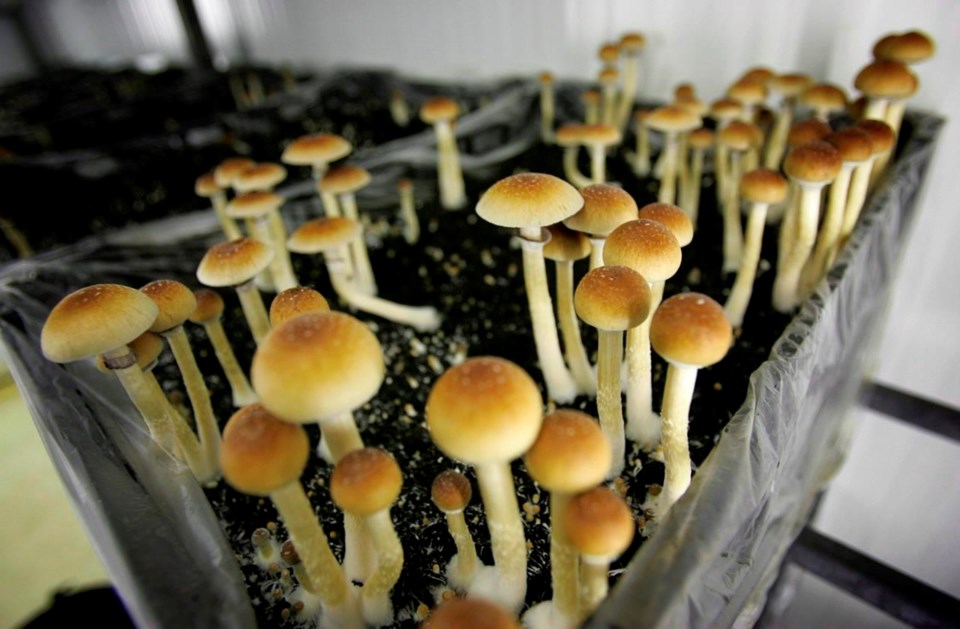Decriminalization of some hard drugs in British Columbia could help reduce stigma around psychedelic substances that have medicinal value, but have been caught up in the war on drugs, experts say.
"The war on drugs is one of the main drivers of the overdose epidemic and it also may be one of the reasons why we're not using the best treatment for mental health — psychedelics," said Zach Walsh, a professor of psychology at the University of British Columbia and a scientist with the B.C. Centre on Substance Use.
"In the '70s, international prohibitions against any number of drugs — including psychedelics, but also harder drugs — began. Since then, they've all been grouped together."
But Walsh said psychedelics, opioids and stimulants should be treated differently.
"So when the war on drugs falls apart, you see decriminalization, you see more acceptance of psychedelics. They could have benefits for mental health. They're both symptoms of a larger shift in public attitudes."
For about three years starting in January 2023, adults in B.C. who have 2.5 grams or less of illicit drugs for personal use — including heroin, cocaine and methamphetamine — will not be arrested, charged or have their drugs seized.
"Instead, police will offer information on available health and social supports and will help with referrals when requested," the province said in a May news release.
Sheila Malcolmson, B.C.’s Minister of Mental Health and Addictions, has said the move would break down the stigma that stops people from accessing life-saving support and services.
As attitudes around hard drugs have shifted, experts have noted a resurged interest in psychedelics. The green light has been given to test psychedelics and their derivatives in hundreds of people around the world in clinical trials.
Damian Kettlewell is the CEO of Clairvoyant Therapeutics, a B.C.-based company conducting clinical trials on more than a hundred people to see how psilocybin, an active ingredient in magic mushrooms, can help treat alcohol use disorder.
Kettlewell said decriminalization of certain illicit substances can help reduce stigma against therapy that involves ingesting consciousness-altering substances — including psilocybin, ketamine, LSD or MDMA (the active ingredient in ecstasy) — in a clinical setting as part of more traditional psychotherapy.
“I would encourage skeptics to look at the history of the war on drugs. LSD was used quite effectively by psychotherapists in California in the '50s for alcoholism," Kettlewell said.
He pointed to the example of Bill Wilson, one of the co-founders of Alcoholics Anonymous, who wrote about trying LSD in the 1950s and mused about the drug potentially helping some of those struggling with alcohol addiction.
"There was a lot of research done in the '50s and '60s in regards to psilocybin and all this research was just stopped," said Kettlewell.
“Then there was a generation of misinformation put out to demonize these substances when they've been used by certain Indigenous communities for thousands of years for positive outcomes."
Alexander Somjen, the CEO of Origin Therapeutics, agrees.
"Decriminalization increases awareness around (addiction and mental health issues) and, therefore, increases the need to find alternative forms of treatment to address the problem," said Somjen, who invests in psychedelic companies.
"A lot of issues with addiction, trauma, depression, anxiety stem from these deeply entrenched thought patterns and neural pathways. Psilocybin has the potential to help people see the world differently and form a new, more positive narrative in their brain as sort of a control-delete function for the brain."
Walsh said the reduced stigma around drugs is a positive step.
"Like any war, it takes a long time to dismantle it, and we're seeing it piece by piece."
This report by The Canadian Press was first published Saturday Aug. 20, 2022.
---
This story was produced with the financial assistance of the Meta and Canadian Press News Fellowship.
Fakiha Baig, The Canadian Press
Note to readers: This is a corrected story. An earlier version, in a quote from Damian Kettlewell, said Alcoholics Anonymous was inspired by an LSD trip that the group's founder had experienced in the '30s. In fact, Bill Wilson tried LSD in the 1950s and then mused about its potential to help some of those struggling with alcohol addiction.



